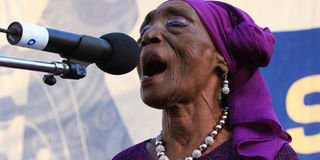She lifted the veil off the Zanzibari woman

Bi Kidude at the Sauti za Busara Festival in Zanzibar last year.
What you need to know:
- She started small but soon realised that she was destined for greatness. At the age of 13, with a sense of empowerment that was way before her time, she made the decision to leave her forced marriage and went into exile in mainland Tanganyika.
FATUMA BINTI BARAKA is no more. The Grand Old Lady of Taarab is dead. Many believe she was about 100 years old. That’s a century folks! She had a front-row seat to history in the making. And she lived to tell the tale. Her mind, even at a century, must have been a wonderland.
It would have been an honour to sit at her feet and listen, to travel back in time to that fork in the road when the Africa of our ancestors was dismantled to make way for the Africa of our colonial masters.
She was a link to the past, representing the richness of Zanzibar’s cultural heritage. Because of her gift for music, a gift that opened doors for her to perform around the world, she became a living legend. She was a legend in life and will certainly remain a legend in death.
Bi Kidude was born at a time when Asian traders on the East African coast had just introduced Rupees to replace cowry shells as the medium of exchange.
She started small but soon realised that she was destined for greatness. At the age of 13, with a sense of empowerment that was way before her time, she made the decision to leave her forced marriage and went into exile in mainland Tanganyika.
From there, she set out on a marathon tour of East Africa, returning to Zanzibar years later where, it is reported, she entered into her second marriage.
According to an article in The Guardian of UK, she married and was divorced twice because she could not have children. Undeterred, she went on to become an unyago practitioner, helping girls to transition sexually from teenage to married women.
The initiations were carried out to the beat of traditional drums accompanied by song and dance. Yes, even in this endeavour, music was Bi Kidude’s medium.
She was a musician at heart, one dedicated to her craft. Just months before her death, at the Sauti za Busara Festival where she had become a mainstay, a frail Bi Kidude was led onto the stage to address the crowd.
Her ill health notwithstanding, she tried to sing but found that she did not have the strength. It was her last time on stage.
Dedicated to her craft though she was, Bi Kidude was also a free spirit. Despite her Muslim faith, she was rarely seen without a lighter in her hand. The lady did love her cigarettes.
There is many an image of Bi Kidude, clutching a cigarette to her mouth, with her eyes squinting against the smoke swirling around her head. Not the picture one usually has of a woman in her hundreds!
But such were the quirks that made her such an enigmatic personality. Not only was she partial to a cigarette, she also loved her drink.
She did her own thing, you could say. Just like former British Premier Margaret Thatcher, who was laid to rest just a day before Bi Kidude was lowered into the ground.
They could not have been further apart in circumstance, yet both will be remembered for their undeniable contributions to humanity. Both attracted controversy for their choices, and both will be remembered for standing their ground and living by the courage of their own convictions.
Bi Kidude said she smoked and drank for fun. She didn’t do it to make a socio-political statement. She did it because she wanted to. That she could act like a man and sing like a lady in a culture that abhorred both, is commendable.
Indeed, The Guardian reports that, together with mentor Siti Binti Saad, Bi Kidude was one of the first Zanzibari women to lift the veil and perform in public. Before that, women lived in seclusion.
The Grand Old Lady of Taarab was certainly a woman before her time. She was the very definition of a trailblazer.
And for her considered contributions to the worlds of women and music, she will be missed. May the road rise up to meet her on her journey to the other side.
Ms Masiga is the Features Editor at The Citizen, Tanzania.




